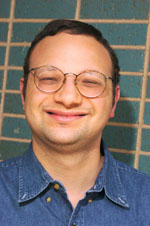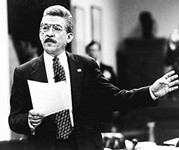A Mixed Farewell to ACC's Fonté
ACC President Richard Fonté steps down and reflects on his administration and its discontents
By Michael King, Fri., Nov. 28, 2003
Reflecting on the achievements of his seven-year tenure, Fonté points first to the additional financial resources garnered by the college's victory in its May property tax referendum, then to the partnerships ACC has established in the community. "We've got a strong partnership established with AISD in career programs," he continues, "a much stronger relationship with the business community, a very strong relationship with the health care community, including underwriting faculty positions, and now a partnership with the Austin Police Department. A community college cannot operate effectively without those kinds of external relationships with all areas of the community." He also described the Eastview Campus, on Webberville Road in East Austin, as a harbinger of ACC's future. "It's not just a token college," he added. "All our health programs are there. We've built a very strong campus in that community."
Fonté says that without the return of additional state support -- "the 2005 session will be absolutely crucial for all higher education" -- the financial progress represented by the property tax increase will be short-lived. But, he adds, the successful referendum after previous defeats not only confirms that Austin is committed to the role of a community college, but shows what the college community itself can do "when everyone works together to articulate a very positive message." Acknowledging that his administration has had its rocky times, he noted, "It's the nature of Austin politics -- we like to debate things. But with the internal and external communities working together, we can make good things happen."
Fonté's tenure was marked by public arguments over everything from paychecks to real estate, and twice the Faculty Senate issued votes of no confidence in him. Although Fonté's resignation came earlier than expected, Daniel Traverso, professor of fine arts and president of the full-time Faculty Senate, says his departure is not a moment too soon. "Our feeling is that every day without him is a step in the right direction. He has not been very good for the college." Traverso points to a "history of terrible problems"-- from a radical restructuring of college governance that produced "chaos" to a persistent inability to keep records straight concerning student grades and faculty paychecks. Most recently, the administration announced that certain adjunct faculty were eligible for health care benefits, which subsequently had to be retracted. "So they say, 'Oops, we're sorry,'" said Traverso, "and adjuncts that had already canceled their current policies are left holding the bag."
Traverso speaks most negatively of Fonté's "One College" plan, which was supposed to streamline governance over the college's six campuses but instead, he says, thoughtlessly abolished divisions and departments, leaving faculty and students adrift and focusing all authority at ACC's Highland administration center. "It turned the college upside down," Traverso said. "It seemed as though anything at all functioning well would be changed, so that it would be dysfunctional." Traverso points to last year's harsh performance review by state Comptroller Carole Keeton Strayhorn as largely validating faculty and student complaints -- the report recommended outside mediators just to get the college community working together again -- and as the impetus that pointed Fonté to the door. "He's been a catastrophe for ACC," concludes Traverso. "And some of the board members have finally begun to realize it."
Yet Traverso acknowledges that adjunct faculty -- the part-timers who outnumber full-time faculty three to one among the school's 1,400 teachers -- fared tangibly better under Fonté, and adjunct faculty leaders speak well of him. "Dr. Fonté's done a great job," said Don Morris, former president of the Adjunct Faculty Association. "He made a new beginning with the adjunct faculty, and improved our job security, our compensation, and our overall representation in college governance." Current association President Don Becker echoed Morris' remarks, saying he hopes the new president will be as "straightforward in conversation" as Fonté. "We have a very comfortable working relationship with him," Becker said, "and we hope to continue that same relationship with a new president." Traverso says that surveys of most adjunct faculty concerning the administration were not nearly so rosy as the picture painted by the AFA's leadership, but Fonté himself points to progress on adjunct faculty issues as an important achievement of his administration.
Mark Goodrich, a staff member and president of the local for the American Federation of Teachers, says he's "delighted" at Fonté's departure -- "it's two or three years too late."
"The college has been in civil war for eight years," said Goodrich, "and his style and behavior only made things worse." He said Fonté had hinted at his resignation in a recent talk with staff, during which he took credit for the college winning the recent referendum on raising the property tax cap. "I had to remind him that the whole college had come together to pass that referendum." Goodrich says he doesn't blame Fonté alone for the rancor that has characterized the college during his tenure, "because he was brought in [by the board] to be the hatchet man." Of the search for a replacement, he says, "We definitely need somebody to bring people together."
Board chairman Quintanilla says that while Fonté definitely had some "ups and downs" at ACC, "We wish him well, and especially thank him for helping us pass the referendum. ... There were periods [under Fonté] when people were very happy." As for the future, he says, ACC needs "somebody who can help us in a growing community college environment, because there are an enormous number of people who need to be educated. We don't need a caretaker, but somebody who can build a bigger faculty, expand facilities, and generate support for the college." For the foreseeable future, he added, the college cannot expect that support to come from state funds. "We can't count on the state very much. The community and the students will have to bear the brunt of growth."
Traverso speaks for many on campus when he says that despite "tremendous" turnover and below-average pay, especially among adjunct faculty, ACC boasts one of the most experienced and credentialed teaching staffs in the state. "We do a good job," he says, "but we've had to do it despite the institution. Whoever the new president is, I hope we can get somebody who really cares about students and education."
For his part, Fonté says he hopes his successor can build on the community relationships established by the college during his administration. "I love Austin," he concluded, "and I loved being able to serve this community. It deserves nothing but the best."
Got something to say on the subject? Send a letter to the editor.










